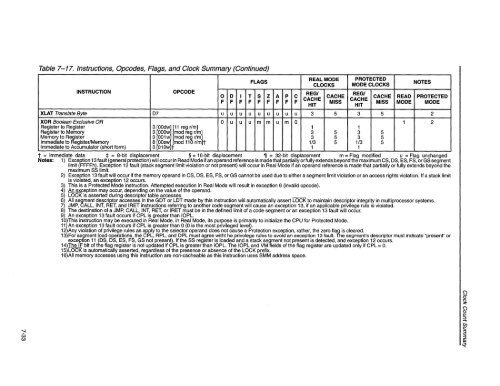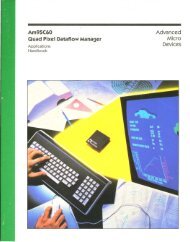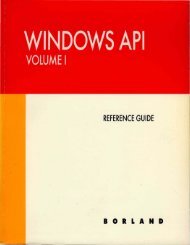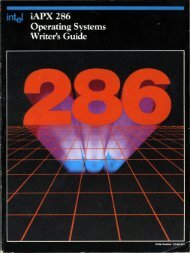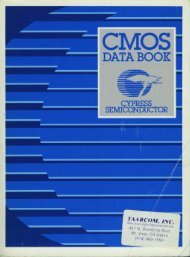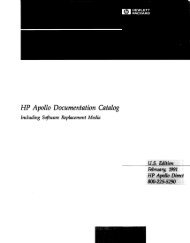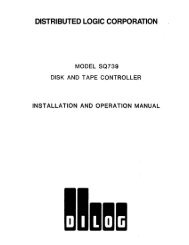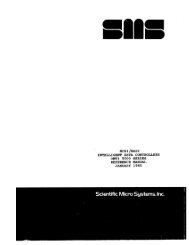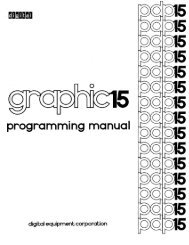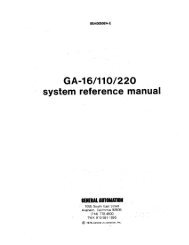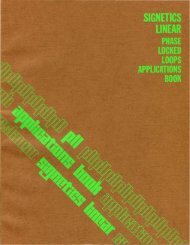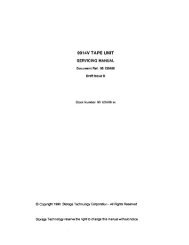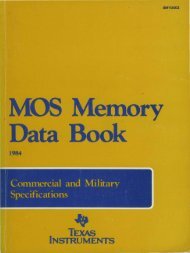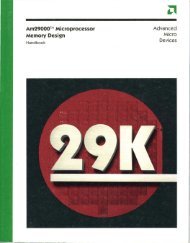TI486 Microprocessor - Al Kossow's Bitsavers
TI486 Microprocessor - Al Kossow's Bitsavers
TI486 Microprocessor - Al Kossow's Bitsavers
You also want an ePaper? Increase the reach of your titles
YUMPU automatically turns print PDFs into web optimized ePapers that Google loves.
Table 7-17. Instructions, Opcodes, Flags, and Clock Summary (Continued)<br />
FLAGS<br />
REAL MODE<br />
CLOCKS<br />
INSTRUCTION OPCODE REG! REG!<br />
0 D I T S Z A P C<br />
CACHE<br />
CACHE<br />
CACHE<br />
F F F F F F F F F<br />
MISS<br />
HIT<br />
HIT<br />
PROTECTED<br />
MODE CLOCKS<br />
NOTES<br />
CACHE READ PROTECTED<br />
MISS MODE MODE<br />
XLAT Translate Byte 07 u u u u u u u u u 3 5 3 5 2<br />
XOR Boolean Exclusive OR 0 u u u m m u m 0 1 2<br />
Register to Register 3 [OOdw] [11 reg rim] 1 1<br />
Register to Memory 3 [OOOw] [mod reg rim] 3 5 3 5<br />
Memory to Register 3 [001 w] [mod reg rim] 3 5 3 5<br />
Immediate to RegisterlMemory 8 [OOsw] [mod 110 r/m]t 1/3 5 1/3 5<br />
Immediate to Accumulator (short form) 3 [010w]t 1 1<br />
t = immediate data + = 8-bit displacement § = 16-bit displacement ~ = 32-bit displacement m = Flag modified u = Flag unchanged<br />
Notes:<br />
1) Exception 13 fault (general protection) will occur in Read Mode if an operand reference is made that partially or fully extends beyond the maximum CS, OS, ES, FS, or GS segment<br />
limit (FFFFh). Exception 12 fault (stack segment limit violation or not present) will occur in Real Mode if an operand reference is made that partially or fully extends beyond the<br />
maximum SS limit.<br />
'<br />
2) Exception 13 fault will occur if the memory operand in CS, OS, ES, FS, or GS cannot be used due to either a segment limit violation or an access rights violation. If a stack limit<br />
is violated, an exception 12 occurs.<br />
3) This is a Protected Mode instruction. Attempted execution in Real Mode will result in exception 6 (invalid opcode).<br />
4) An exception may occur, depending on the value of the operand.<br />
5) LOCK is asserted during descriptor table accesses. __<br />
6) <strong>Al</strong>l segment descriptor accesses in the GOT or LOT made by this instruction will automatically assert LOCK to maintain descriptor integrity in multiprocessor systems.<br />
7) JMP, CALL, INT, RET, and IRET instructions referring to another code segment will cause an exception 13, if an applicable privilege rule is violated.<br />
8) The destination of a JMP, CALL, INT, RET, or IRET must be in the defined limit of a code segment or an exception 13 fault will occur.<br />
9) An exception 13 fault occurs if CPL is greater than IOPL.<br />
10)This instruction may be executed in Real Mode. in Real Mode, its purpose is primarily to initialize the CPU for Protected Mode.<br />
11) An exception 13 fault occurs if CPL is greater than 0 (0 is the most privileged level).<br />
12)Any violation of privilege rules as apply to the selector operand does not cause a Protection exception, rather, the zero flag is cleared.<br />
13)For segment load operations, the CPL, RPL, and OPL must agree witht he privolege rules to avoid an exception 13 fault. The segment's descriptor must indicate "presenf' or<br />
exception 11 (OS, OS, ES, FS, GS not present). If the SS register is loaded and a stack segment not present is detected, and exception 12 occurs.<br />
14)The IF bit of the flag register is not updated if CPL is greater than IOPL. The IOPL and VM fields of the flag register are updated only if CPL = o.<br />
15)LOCK is automatically asserted, regardless of the presence or absence of the LOCK prefix.<br />
16)AII memory accesses using this instruction are non-cacheable as this instruction uses SMM address space.<br />
'-.I<br />
W<br />
w<br />
Q<br />
c<br />
~<br />
~<br />
§<br />
-<br />
I<br />
-


